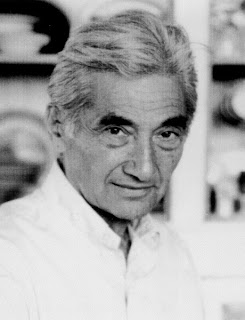Howard Zinn (1922-2010)
A well-lived life of 87 years is something to celebrate and be joyful for, but some deaths strongly separate the world that remains for us, the living, from the one that was there only a few hours or days before.
Howard Zinn almost single-handedly changed the way I saw the world. I was in high school when I encountered A People's History of the United States and Declarations of Independence
and Declarations of Independence and I have never been the same since. They hit me like alien messages from a more enlightened planet. I'm not sure I've ever learned as much from any other books, if learning can be defined not only as the gaining of information but the adding of awareness, the opening of new vistas previously hidden. I expect this was Zinn's effect for many people, especially those who, like me, encountered his writings during particularly impressionable years.
and I have never been the same since. They hit me like alien messages from a more enlightened planet. I'm not sure I've ever learned as much from any other books, if learning can be defined not only as the gaining of information but the adding of awareness, the opening of new vistas previously hidden. I expect this was Zinn's effect for many people, especially those who, like me, encountered his writings during particularly impressionable years.
I went to lectures Zinn gave three or four times, mostly during the mid-1990s. I bought audio tapes of some of his lectures and radio appearances. I eventually collected most of his books. After Matt Damon gave him a shout-out in Good Will Hunting and then George W. Bush was appointed President, Zinn seemed to be everywhere, with lots of new books, CDs, DVDs, TV shows... I didn't keep up with him too much during the last decade, mostly because I had other interests, other things to look at and read, but I was glad he was out there, fighting the good fight, and I was thrilled to see he was able now to draw bigger crowds than had ever attended the events I'd seen him at.
What struck me in Zinn's writing was the clarity of its arguments; what struck me in him as a person was his apparent decency. He didn't come off as a wild-eyed nutball, which folks on the political right-wing surely saw him to be, but as a fairly normal guy who'd been thinking about stuff and wondered why, as human beings who proclaim ourselves to be decent and civilized, we are so often willing to wield power in both our political and personal lives in ways that are fundamentally indecent and uncivilized. "Why are we so horrible to each other?" he seemed to ask, "And why do we support systems that are profoundly more horrible than most of us would ever dream of being?"
There will be plenty of eulogies for Howard Zinn. I hope they're full of his own words. Here, for instance, are the last paragraphs of Declarations of Independence:
Howard Zinn almost single-handedly changed the way I saw the world. I was in high school when I encountered A People's History of the United States
I went to lectures Zinn gave three or four times, mostly during the mid-1990s. I bought audio tapes of some of his lectures and radio appearances. I eventually collected most of his books. After Matt Damon gave him a shout-out in Good Will Hunting and then George W. Bush was appointed President, Zinn seemed to be everywhere, with lots of new books, CDs, DVDs, TV shows... I didn't keep up with him too much during the last decade, mostly because I had other interests, other things to look at and read, but I was glad he was out there, fighting the good fight, and I was thrilled to see he was able now to draw bigger crowds than had ever attended the events I'd seen him at.
What struck me in Zinn's writing was the clarity of its arguments; what struck me in him as a person was his apparent decency. He didn't come off as a wild-eyed nutball, which folks on the political right-wing surely saw him to be, but as a fairly normal guy who'd been thinking about stuff and wondered why, as human beings who proclaim ourselves to be decent and civilized, we are so often willing to wield power in both our political and personal lives in ways that are fundamentally indecent and uncivilized. "Why are we so horrible to each other?" he seemed to ask, "And why do we support systems that are profoundly more horrible than most of us would ever dream of being?"
There will be plenty of eulogies for Howard Zinn. I hope they're full of his own words. Here, for instance, are the last paragraphs of Declarations of Independence:
One of the scientists who worked on the atomic bomb, who later was a scientific adviser to President Eisenhower, chemist George Kistiakowsky, devoted the last years of his life, as he was dying of cancer, to speaking out against the madness of the arms race in every public forum he could find. Toward the very end, he wrote, in the Bulletin of the Atomic Scientists: "I tell you as my parting words. Forget the channels. There simply is not enough time left before the world explodes. Concentrate instead on organizing, with so many others of like mind, a mass movement for peace such as there has never been before."
He understood that it was not the bomb he had worked on, but the people he had come to work with, on behalf of peace, that were the ultimate power.
